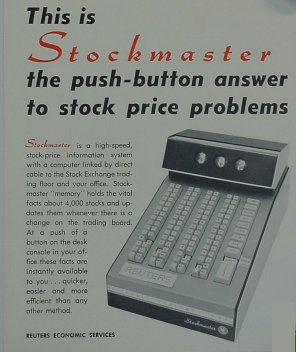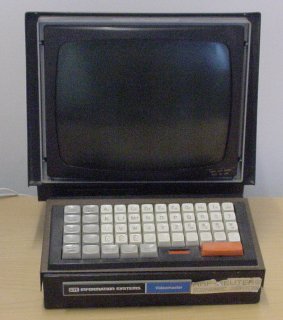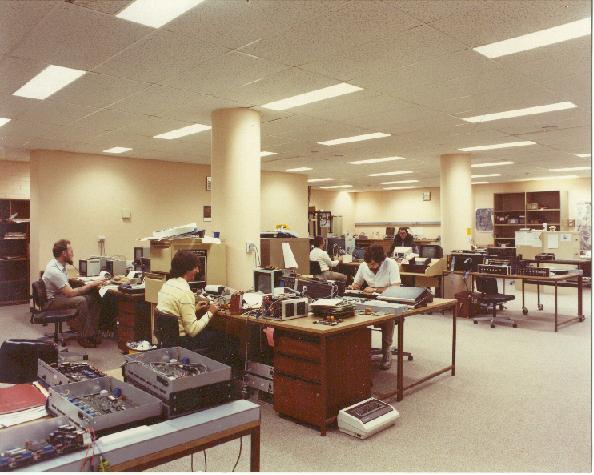AAP-Reuters Economic Services (AAP-Res)
AAP & Reuters Commerical venture 1984
formingAAP-Res Financial Service Division of AAP Information
AAP-Res Communications Pty Ltd
Information sourced from AAP documentAAP & Reuters
In 1946 AAP became an owner, with the purchase of 13.9 percent shareholding of Reuters. AAP acquired exclusive distribution rights of Reuter world news and Financial information services. With the public floating of Reuters in 1984, AAP relinquished its direct shareholding, and continued in a long term commercial agreement.This saw the introduction of two groups.
- The Financial Market Service (AAP-Res FSD) was formed to supply the joint services of AAP and Reuters Financial Services to the virgining Security and Money markets in Australia.
- The AAP-Res Communications Pty Ltd - This company main principal aim is to design, install, supply and manage the latest in communication network technology for Australian business.
AAP-Res Sales
AAP_Res Sales
Stockexchange - Input Operators
The information for the clients system was supplied by AAP-Res operators. Input terminals were placed on the trading floor of the Brisbane Stock Exchanges (and other state Stock Exchanges), the operator would watch the market on the board, when the price was changed by the 'chalky', the input operator would type this information onto the terminal screen. This was then transmitted to the SGS system in Sydney.Early Products
Stockmaster
AAP Res started by supplying to the market a product called Stockmaster.
- This system consisted of a number unit (for the operators) connected to a controller in the Broking business.
- The controller communicated back to the central system in Sydney by slow data or by telex lines to the SGS system in Glebe.
Videomaster

- The videomaster screen and keyboard replaced the nixie tubes displays/keyboard unit.
- The controller was replaced with a 45RU cabinet. Inside this unit were logic cards. These cards were covered with discrete components (IC and transistors).
- Communications was then improved with higher speed lines. 1200 bps datel.
- The SGS system was able to run both systems.
MES300
The introduction of the IDR MES300 controller allowed a new wire service called Monitor (started 1976), a text information system to be delivered to the Brokers and Banking clients. This revolutionised the way information was delivered to the world market. These units were able to supply six (screen and keyboards) outputs. They had their own data line (1200 bps). Modification were made to the Videomaster to graft the MES300 into the Videomaster controllers to allow this information to be view on the their screens.Joint products
PDP8-420

PDP8- 420 in pieces in workshop
Between the introduction of the next generation of hardware the DEC PDP8-420 controller was adapted and used to do a similar function the the videomaster and MES300 combination. This unit was used successfully with remote dialups and was used in dealing rooms which Brisbane did not have.
MES500 (MQT)
The idea of grafting the MES300 into the Videomaster, limited some of the newer functions that AAP Reuters required. IDR in conjunction with Reuters built a new controller called the MES500. This unit allowed the screen layout and more functionality to be added by programming. The firmware was then saved onto the eprom chips arrays. In Australia the unit was know as Multi Quote Terminal. (MQT) The MQT was able to supply 10 workstations, two serial interfaces and a printer.Reuter Terminal
With the acceptance of the IBM PC as and industrial standard, Reuter introduced the Reuter Terminal. This unit was use as a standalone terminal and was able to be modified by adding new software (floppy disks), not changing eprom chips. Its only drawback against the MQT was the communication costs. The Reuters Terminal line speeds were increase to 9600 (IDN feed) and was able to offer a superior product. Reuters introduced the Advance Reuter Terminal (ART). The clients then were able to use products like Microsoft Excel for modelling. Companies like MT Isa Mines, NAB International divisions and Queensland Investment Corp were large user in Brisbane.CDF, DDF Controllers
Calculated Data Feed (CDF) and Dedicated Data Feed (DDF) were special boxes that Reuters introduced to allow Clients to capture the information that they required to do their own economic modelling. Basically they used the IDN feed, the clients system request information which was cached to be used by their system. The Queensland Treasury used this system.Reuters also had specialised dealing room system, and they were based in Sydney, Melbourne and Perth. ANZ did use a remote arm of the product in their money market area in Brisbane.
AAP-Res Hardware and Tools
AAP_Res Hardware and Tools
AAP-Res Communications Pty Ltd
AAP Res Communications Pty Ltd was formed to develop R & D projects in Australia, and also to help to install and maintain the Reuters products. This leading edge technology required specialised trained technician and installers. Very few clients had the manpower with the qualification to understand the communications or repair the equipment.The typical clients office may have had one or two Telecom Datel modem, a controller with keyboard cable (52 core for Stockmaster and Videomaster systems & 10 core for MES300 and MQT) and a video cable (75 ohm Beldon) run to their desk for the keyboard and screens.
The sheer numbers and pieces of equipment needed bulk storage. Spares had to be shipped around the country. A central repair centre was located in the early days at the 2GB building in Sussex St Sydney City.
The workshops then had to be shifted to Ross St, in Glebe Sydney.


